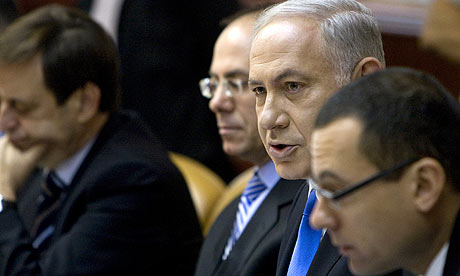
Israel's defence ministry will approve the construction of 500 new settlement homes in the occupied West Bank this week, in a last-minute move before agreeing a compromise settlement freeze with the United States.
The authorisation comes despite criticism from Washington and weakens the effect any suspension of Israeli settlement construction will have. During the Israeli pause, work will continue on these new homes and on 2,500 others where Israel says construction has already started.
Binyamin Netanyahu, the Israeli prime minister, has reportedly told members of his Likud party that he will finalise a deal with the Obama administration when the US Middle East envoy, George Mitchell, visits Jerusalem later this week.
After a weekend of talks with his party and other key politicians, Netanyahu appears to have won the backing of his coalition for the settlement agreement, which will be a much watered-down version of what the US had demanded. He reportedly talked of a "reduction" in construction, rather than a freeze or a pause. The agreement is an initial stage designed to restart Middle East negotiations.
Several influential cabinet ministers backed Netanyahu, with Eli Yishai, a deputy prime minister and head of the ultra-Orthodox Shas party, saying what Israel was offering was no more than a "strategic delay", and that settlement building would continue in future. The transport minister, Yisrael Katz, from Netanyahu's Likud party, said the move was "well-conceived".
Meanwhile, one Israeli report said work has begun on 20 homes in a new settlement, Maskiot, in the northern Jordan Valley in the West Bank. The homes, built on the site of a former Israeli military base, were intended for settlers the Israeli government withdrew from Gaza four years ago, according to Ynet, the website of the Yedioth Ahronoth newspaper.
Construction approvals were given last year, it said.
Thousands of new settlement homes have been approved in the last few years. The settler population continues to grow rapidly: today there are nearly 500,000 settlers in East Jerusalem and the West Bank. Settlements on occupied land are illegal under international law.
Mitchell, the US envoy, will fly back to Israel later this week, or early next week, for more talks with the Israeli government, hoping to finalise the settlement suspension. Two Netanyahu aides were in Washington last week telling him of the plans for the new construction approvals before the suspension begins.
The White House was quick to respond, saying: "The United States does not accept the legitimacy of continued settlement expansion and we urge that it stop. We are working to create a climate in which negotiations can take place, and such actions make it harder to create such a climate."
Yossi Alpher, an Israeli analyst and former Mossad official, said Netanyahu was making a "finely gauged calculation" to avoid an open rebellion within his government so soon after February's elections. Alpher was sceptical that a genuine peace deal would result from this process.
"There is a huge jump to hope that the actual process that all this launches will get somewhere," he said. "We are really focusing on a very preliminary and temporary step which in the long run will not mean very much if the idea of serious negotiations are being contemplated here."
The US hopes this month to convince Netanyahu and the Palestinian Authority president, Mahmoud Abbas, to start the first peace talks in more than a year. The Obama administration had insisted that Israel stop all settlement activity, including so-called "natural growth", in line with its commitments under the 2003 road map to peace.
But Israel resisted. Now Netanyahu is offering to pause settlement building only in the occupied West Bank, not in East Jerusalem, and only for a limited period, perhaps six months. In addition he wants construction to continue on the soon-to-be approved homes and others where work has started. One Israeli report suggested the suspension could begin as early as next month.
It looks like a deal intended to go some way towards meeting Washington's demands, while also retaining the support of his rightwing coalition, which includes many pro-settler politicians.
"The postponement in construction is a strategic delay," Yishai said yesterday. "We won't give up on building in Jerusalem and will still build hundreds of construction units."
In return, Arab states are to take some steps towards diplomatic links, allowing Israeli flights over their land or, in some cases, reopening Israeli trade offices.
But for now the Palestinians say they will not sit down for talks without all settlement building ceasing. Saeb Erekat, the chief Palestinian negotiator, said the new construction "undermines efforts being exerted to revive the peace process".
Yossi Alpher, an Israeli analyst and former Mossad official, said Netanyahu was making a "finely gauged calculation" to avoid an open rebellion within his government so soon after February's elections. Alpher was sceptical that a genuine peace deal would result from this process.
"There is a huge jump to hope that the actual process that all this launches will get somewhere," he said. "We are really focusing on a very preliminary and temporary step which in the long run will not mean very much if the idea of serious negotiations are being contemplated here."
0 comments:
Post a Comment